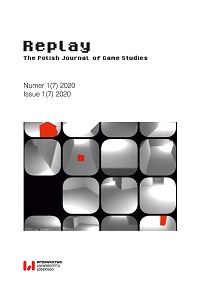Motives for Playing Video Games in the Context of Time. Results of Empirical Research
DOI:
https://doi.org/10.18778/2391-8551.07.01Keywords:
games, video games, players’ motivation, players’ typology, gameplay timeAbstract
Video games are one of the most popular leisure activities. The multitude of games and ways of playing (individually, in a team, online, offline, etc.) allows players to meet their various needs. Thus, from the point of view of game developers, it becomes important to recognise these needs and adapt the product to the expectations of players. Taking the dynamic development of the video game market into account, it seems significant to recognise the players’ motives for spending their time on playing. Therefore, the aim of the article is to identify the players’ motives in terms of the type of need being met and to find an answer to the question whether there is a relationship between the time spent on games and the motives for playing (does the fact that we play longer change the type of need being satisfied?). The text refers to the results of research conducted in April 2020 on a sample of 2,527 players in Poland. The subjects of the study were people who actively played video games – every day or several times a week.
References
Aarseth, E.J. (1997). Cybertext: Perspectives on Ergodic Literature. Baltimore: The Johns Hopkins University Press.
Google Scholar
Andrias, R.M., & Sunar, M.S. (2019). User/Player Type in Gamification. International Journal of Advanced Trends in Computer Science and Engineering, 8(1.6). https://doi.org/10.30534/ijatcse/2019/1481.62019
Google Scholar
DOI: https://doi.org/10.30534/ijatcse/2019/1481.62019
Apperley, T.H. (2006). Genre and Game Studies: Toward a Critical Approach to Video Game Genres. Simulation and Gaming, 37(1), 6–23. https://doi.org/10.1177/1046878105282278
Google Scholar
DOI: https://doi.org/10.1177/1046878105282278
Bartle, R. (1996). Hearts, Clubs, Diamonds, Spades: Players Who Suit MUDs. Journal of MUD research, 1(1), 19. https://mud.co.uk/richard/hcds.htm#Bartle,%201990b
Google Scholar
Bartle, R. (2005). Virtual Worlds: Why People Play. Massively Multiplayer Game Development 2(2), 3–18. https://mud.co.uk/richard/VWWPP.pdf
Google Scholar
Bateman, C., & Boon, R. (2005). 21st Century Game Design. Newton: Charles River Media.
Google Scholar
Bateman, C., Lowenhaupt, R., & Nacke, E.L. (2012). Player Typology in Theory and Practice. Proceedings of DiGRA 2011 Conference: Think Design Play.
Google Scholar
Bilińska-Reformat, K., Dewalska-Opitek, A., & Hofman-Kohlmeyer, M. (2020). To Mod or Not to Mod–An Empirical Study on Game Modding as Customer Value Co-Creation. Sustainability, 12, 9014, 1–16. https://doi.org/10.3390/su12219014
Google Scholar
DOI: https://doi.org/10.3390/su12219014
Billieux, J., Chanal, J., Khazaal, Y., Rochat, L., Gay, P., Zullino, D., & Van der Linden, M. (2011). Psychological Predictors of Problematic Involvement in Massively Multiplayer Online Role-Playing Games: Illustration in a Sample of Male Cybercafé Players. Psychopathology, 44(3), 165–171. https://doi.org/10.1159/000322525
Google Scholar
DOI: https://doi.org/10.1159/000322525
Bushman, B.J.,& Anderson, C.A.(2002). Violent Video Games and Hostile Expectations: A Test of the General Aggression Model. Personality and Social Psychology Bulletin, 28(12), 1679–1686. https://doi.org/10.1177/014616702237649
Google Scholar
DOI: https://doi.org/10.1177/014616702237649
Cash, H., & McDaniel, K. (2014). Dzieci konsoli. Uzależnienie od gier. Poznań: Wydawnictwo Media Rodzina.
Google Scholar
Chappell, D., Eatough, V., Davies, M., & Griffiths, M. (2006). EverQuest – It‘s Just a Computer Game Right? An Interpretative Phenomenological Analysis of Online Gaming Addiction. International Journal of Mental Health and Addiction, 4(3), 205–216. https://doi.org/10.1007/s11469-006-9028-6
Google Scholar
DOI: https://doi.org/10.1007/s11469-006-9028-6
Cummings, H.M., & Vandewater, E.A. (2007). Relation of Adolescent Video Gameplay to Time Spent in Other Activities. Achieves of Pediatrics & Adolescent Medicine, 161(7), 689. https://doi.org/10.1001/archpedi.161.7.684
Google Scholar
DOI: https://doi.org/10.1001/archpedi.161.7.684
Dauriat, F.Z., Zermatten, A., Billieux, J., Thorens, G., Bondolfi, G., Zullino, D., & Khazaal, Y. (2011). Motivations to Play Specifically Predict Excessive Involvement in Massively Multiplayer Online Role-Playing Games: Evidence From an Online Survey. European Addiction Research, 17(4), 185–189. https://doi.org/10.1159/000326070
Google Scholar
DOI: https://doi.org/10.1159/000326070
Demetrovics, Z., Urbán, R., Nagygyörgy, K., Farkas, J., Zilahy, D., Mervo, B. & Harmath, E. (2011). Why Do You Play? The Development of the Motives for Online Gaming Questionnaire (MOGQ). Behavior Research Methods, 43(3), 814–825. https://doi.org/10.3758/s13428-011-0091-y
Google Scholar
DOI: https://doi.org/10.3758/s13428-011-0091-y
Eastin, M.S., & Griffiths, R. (2006). Beyond the Shooter Game. Communication Research, 33(6), 448–466. https://doi.org/10.1177/0093650206293249
Google Scholar
DOI: https://doi.org/10.1177/0093650206293249
Eysenck, M.W. (2016). Hans Eysenck: A Research Evaluation. Personality and Individual Differences, 103, 209–219. https://doi.org/10.1016/j.paid.2016.04.039
Google Scholar
DOI: https://doi.org/10.1016/j.paid.2016.04.039
Falkowska, M. (2011). Gry wideo jako nowe medium – podstawowe kategorie badawcze. Kultura i Historia, 19. https://www.kulturaihistoria.umcs.lublin.pl/archives/2390
Google Scholar
Filiciak, M. (2006). Wirtualny plac zabaw. Gry sieciowe i przemiany kultury współczesnej. Warszawa: Wydawnictwa Akademickie i Profesjonalne.
Google Scholar
de Freitas, S., & Liarokapis, F. (2011). Serious Games: A New Paradigm for Education? In M. Ma, A. Oikonomou, L. Jain (eds.), Serious Games and Edutainment Applications (pp. 9–23). Londyn: Springer London. https://doi.org/10.1007/978-1-4471-2161-9_2
Google Scholar
DOI: https://doi.org/10.1007/978-1-4471-2161-9_2
Graham, L.T., & Gosling, S.D. (2013). Personality Profiles Associated with Different Motivations for Playing World of Warcraft. Cyberpsychology, Behavior and Social Networking, 16(3), 189–193. https://doi.org/10.1089/cyber.2012.0090
Google Scholar
DOI: https://doi.org/10.1089/cyber.2012.0090
Griffiths, M.D. (2010). Online: Video Gaming: What Should Educational Psychologists Know? Educational Psychology in Practice, 26(1), 35–40. https://doi.org/10.1080/02667360903522769
Google Scholar
DOI: https://doi.org/10.1080/02667360903522769
Griffiths, M.D., Davies, M.N.O., & Chappell, D. (2003). Breaking the Stereotype: The Case of Online Gaming, CyberPsychology & Behavior, 6(1), 81–91. https://doi.org/10.1089/109493103321167992
Google Scholar
DOI: https://doi.org/10.1089/109493103321167992
Grüsser, S.M., Thalemann, R., & Griffiths, M.D. (2007). Excessive Computer Game Playing: Evidence for Addiction and Aggression? Cyberpsychology & Behavior, 10(2), 290–292. https://doi.org/10.1089/cpb.2006.9956
Google Scholar
DOI: https://doi.org/10.1089/cpb.2006.9956
Hussain, Z., & Griffiths, M.D. (2008). Gender Swapping and Socializing in Cyberspace: An Exploratory Study. Cyberpsychology & Behavior, 11(1), 47–53. https://doi.org/10.1089/cpb.2007.0020
Google Scholar
DOI: https://doi.org/10.1089/cpb.2007.0020
Instytut Badania Rynku i Opinii Publicznej Norstat (2018). Fenomen Dojrzałego Gracza. https://fenomengracza.pl
Google Scholar
Ipsos (2014). #jestemgraczem. http://www.jestemgraczem.com/assets/jestemgraczem_raport_z_badania.pdf
Google Scholar
Kim, E.J., Namkoong, K., Ku, T., & Kim, S.J. (2008). The Relationship between Online Game Addiction and Aggression, Self-Control and Narcissistic Personality Traits. European Psychiatry, 23(3), 212–218. https://doi.org/10.1016/j.eurpsy.2007.10.010
Google Scholar
DOI: https://doi.org/10.1016/j.eurpsy.2007.10.010
Kim, Y., Ross, S.D., & Ko, Y. (2007). Online Sport Video Gaming Motivations. International Journal of Human Movement Science, 1(1), 41–62.
Google Scholar
Király, O., Nagygyörgy, K., Griffiths, M.D., & Demetrovics, Z. (2014). Problematic Online Gaming. In Behavioral Addictions: Criteria, Evidence, and Treatment (pp. 61–97). Cambridge: Academic Press. https://doi.org/10.1016/B978-0-12-07724-9.00004-5
Google Scholar
DOI: https://doi.org/10.1016/B978-0-12-407724-9.00004-5
Lazzaro, N. (2004). Why we Play Games: Four Keys to More Emotion without Story. Game Dev Conf.
Google Scholar
Linder, J., & Zichermann, G. (2010). Game-Based Marketing: Inspire Customer Loyalty Through Rewards, Challenges, and Contests. New York: John Wiley & Sons.
Google Scholar
Lo, S.K., Wang, C.C., & Fang, W. (2005). Physical Interpersonal Relationships and Social Anxiety among Online Game Players. Cyberpsychology & Behavior, 8(1), 15–20. https://doi.org/10.1089/cpb.2005.8.15
Google Scholar
DOI: https://doi.org/10.1089/cpb.2005.8.15
Mazurkiewicz, B. (2016). Wpływ immersji na odbiór komunikatów marketingowych lokowanych w grach komputerowych (unpublished doctoral dissertation). Poznań: Uniwersytet Ekonomiczny w Poznaniu.
Google Scholar
Nacke, L.E., Bateman, C., & Mandryk, R.L. (2013). BrainHex: A Neurobiological Gamer Typology Survey. Entertainment Computing, 5(1), 55–62. https://doi.org/10.1016/j.entcom.2013.06.002
Google Scholar
DOI: https://doi.org/10.1016/j.entcom.2013.06.002
Osathanunkul, C. (2015). A Classification of Business Models in Video Game Industry. International Journal of Management Cases, 17(1), 35–45. http://www.ijmc.org/ijmc/vol_17.1_files/17.1.pdf#page=35
Google Scholar
Pacuraru, R.O. (2012). Virtual Organizations. Economics, Management, and Financial Markets, 7(4), 695–702.
Google Scholar
Petrowicz, M. (2015). Zasady przeciw immersji. Zaangażowanie w narrację i zaangażowanie w system formalny gry. Replay. The Polish Journal of Game Studies, 2(1), 35–49. https://doi.org/10.18778/2391-8551.02.03
Google Scholar
DOI: https://doi.org/10.18778/2391-8551.02.03
Polish Gamers Observatory (2019). Polish Gamers Research 2019. https://polishgamers.com/pgr/polish-gamers-research-2019/general-information-about-our-study/
Google Scholar
Silva, L., & Mousavidin, E. (2015). Strategic Thinking in Virtual Worlds: Studying World of Warcraft. Computers in Human Behavior, 46, 168–180. https://doi.org/10.1016/j.chb.2014.12.047
Google Scholar
DOI: https://doi.org/10.1016/j.chb.2014.12.047
Smyth, J.M. (2007). Beyond Self-Selection in Video Game Play: An Experimental Examination of the Consequences of Massively Multiplayer Online Role-Playing Game Play. Cyberpsychology & Behavior, 10(5), 717–721. https://doi.org/10.1089/cpb.2007.9963
Google Scholar
DOI: https://doi.org/10.1089/cpb.2007.9963
Squire, K. (2011). Video Games and Learning: Teaching and Participatory Culture in the Digital Age. New York: Teachers College Press.
Google Scholar
Stefańska, M., & Mazurkiewicz, B. (2021). Archetypes of Video Game Players – Do Other Typologies Exists. In 37th IBIMA Conference: April 2021, Cordoba, Spain. https://ibima.org/accepted-paper/archetypes-of-video-game-players-do-other-typologies-exists/
Google Scholar
Sublette, V.A., & Mullan, B. (2012). Consequences of Play: A Systematic Review of the Effects of Online Gaming. International Journal of Mental Health and Addiction, 10(1), 3–23. https://doi.org/10.1007/s11469-010-9304-3
Google Scholar
DOI: https://doi.org/10.1007/s11469-010-9304-3
Šporčić, B., & Glavak-Tkalić, R. (2018). The Relationship between Online Gaming Motivation, Self-Concept Clarity and Tendency toward Problematic Gaming. Cyberpsychology: Journal of Psychosocial Research on Cyberspace, 12(1). https://doi.org/10.5817/CP2018-1-4
Google Scholar
DOI: https://doi.org/10.5817/CP2018-1-4
Tondello, G.F., Wehbe, R.R., Diamond, L., Busch, M., Marczewski, A., & Nacke, L.E. (2016). The Gamification User Types Hexad Scale. In Proceedings of the 2016 Annual Symposium on Computer-Human Interaction in Play – CHI PLAY ’16. Austin, TX, USA. ACM. https://doi.org/10.1145/2967934.2968082
Google Scholar
DOI: https://doi.org/10.1145/2967934.2968082
Urbańska-Galanciak, D. (2009). Homo players. Strategie odbioru gier komputerowych. Warszawa: Wydawnictwa Akademickie i Profesjonalne.
Google Scholar
Williams, D. (2006). Groups and Goblins: The Social and Civic Impact of an Online Game. Journal of Broadcasting & Electronic Media, 50(4), 651–670. https://doi.org/10.1207/s15506878jobem5004_5
Google Scholar
DOI: https://doi.org/10.1207/s15506878jobem5004_5
Wowra, W. (2008). Rynek reklam w grach. Marketing w Praktyce, 3, 13–15.
Google Scholar
Wu, A., Lai, M., Yu, S., Lau, J., & Lei, M. (2017). Motives for Online Gaming Questionnaire: Its Psychometric Properties and Correlation with Internet Gaming Disorder Symptoms among Chinese People. Journal of Behavioral Addictions, 6(1), 11–20. https://doi.org/10.1556/2006.6.2017.007
Google Scholar
DOI: https://doi.org/10.1556/2006.6.2017.007
Yee, N. (2006). The Demographics, Motivations, and Derived Experiences of Users of Massively Multi-User Online Graphical Environments. Presence Teleoperators & Virtual Environments, 15(3), 309–329. https://doi.org/10.1162/pres.15.3.309
Google Scholar
DOI: https://doi.org/10.1162/pres.15.3.309
Downloads
Published
How to Cite
Issue
Section
License

This work is licensed under a Creative Commons Attribution-NonCommercial-NoDerivatives 4.0 International License.










